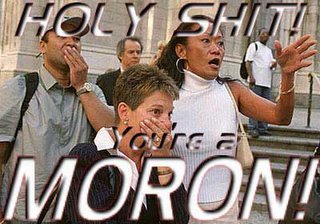Pollution worse for Blacks.

This is from BET (Black Entertainment Television, you know, kinda like WET. . . White Entertainment Television)
I like where he says: "But Katrina showed that racism is alive and well in America". No shit!! When you try to say 'Poor blacks, oh, POOOOOR blacks!!!" you are supporting racism!! The only reason racism is alive and well is because of the blacks out there that WANT it.
"Pollution is worse for us". Welcome to Chocolate town.
What about: "Some charge that the Bush administration has made matters worse by creating new policies, like the Clear Skies Act and the Healthy Forest Initiative, that allow utilities and industries to pollute more." Care to elaborate? No? Oh, is that because you have no cause? That by stating the facts, you would show that you are a MORON?!
Oh, and the writer mis-spelled 'discernible'
Posted Jan. 18, 2006 – If you thought Hurricane Katrina was a once-in-a-lifetime fluke, think again. Concerned environmentalists say that unless the United States gets real about the threat of global warming, African Americans and other people of color can expect a repeat of disasters like Katrina.
“When you look at the trends and put them all together, it’s undisputable that the sea levels are rising,” says Ansje Miller, director of the Environmental Justice and Climate Change Initiative (EJCC). “Warmer seas mean more intense hurricanes…. You’re going to have intense flooding like we have never seen before. Katrina is really the hurricane of the future.”
Bad News for Blacks
Environmentalists blame the fierce new storms on global warming – the increase in the average temperature of the Earth's atmosphere and oceans. Scientists attribute the phenomenon to gases produced by fossil fuels like gasoline, petroleum and coal. Though critics dismiss global warming as junk science, reports from the Intergovernmental Panel on Climate Change (IPCC) have continually found a discernable human influence on world temperatures.
That’s bad news, especially for African Americans. Citing Katrina as a case-in-point, some environmentalists say global warming impacts minorities and the disadvantaged harder than other groups. If global warming gets worse, many African-American communities will be more vulnerable to breathing ailments, insect-carried diseases and heat-related illness and death. But asking Black folks to give up gas-guzzling SUV’s and other bling is a tough sell.
“It has been ingrained in our heads that to be anything, you must have everything,” says EJCC steering committee member Nia Robinson. “Because some of us have a big car and a nice house, people aren’t seeing that racism still exists. But Katrina showed that racism is alive and well in America. Now that people have that idea, I think we’re in a really critical stage to organize, educate and mobilize people.”
Pollution Worse for Us
Relatively, Blacks are environmental Good Samaritans. Per capita, we emit approximately 20 percent less carbon dioxide than Whites – well below 2020 targets set by the U.S. Climate Stewardship Act. Not only do we use more energy-conserving public transportation, we spend considerably less per capita on energy-intensive material goods.
Yet Blacks are exposed to worse air pollution than Whites in every major metropolitan area. Some charge that the Bush administration has made matters worse by creating new policies, like the Clear Skies Act and the Healthy Forest Initiative, that allow utilities and industries to pollute more. President Bush enraged environmentalists when he opted out of the Kyoto protocol global warming treaty, saying it would harm the U.S. economy.
Critics say the result of these policies could be catastrophic. “By mid-century, we’re looking at the entire Antarctic ice shelf melting,” Miller says. “That could send warmer water throughout… which will have a freezing effect in the Northern European countries. We’re already looking at a number of low-lying areas being completely submerged by sea-level rise. It’s kind of scary.”
Toward a solution, Miller says America must conform with international protections while reducing fossil fuel use. She hopes that the U.S. begins aggressively fining polluters and investing the resulting funds towards sustainable alternatives.
“Katrina showed us that we don’t know how to deal with (environmental disasters),” Miller says. “We really need to make sure that we have mechanisms, escape routes and policies in place that are going to protect those who are most vulnerable.”


0 Comments:
Post a Comment
<< Home